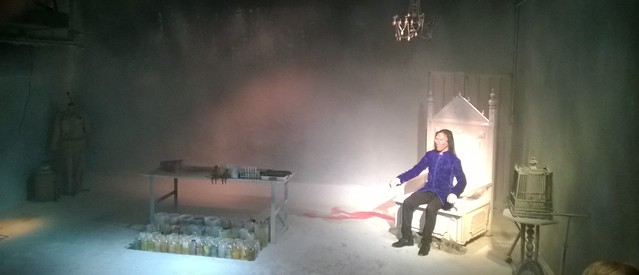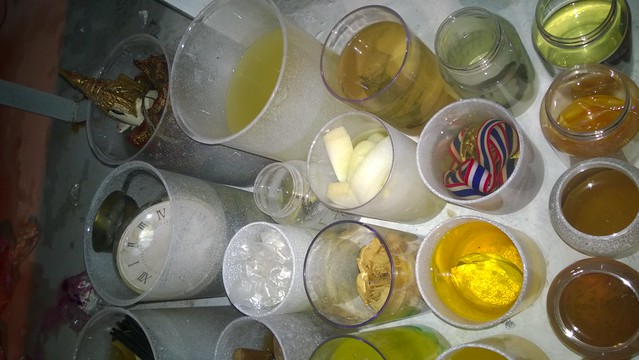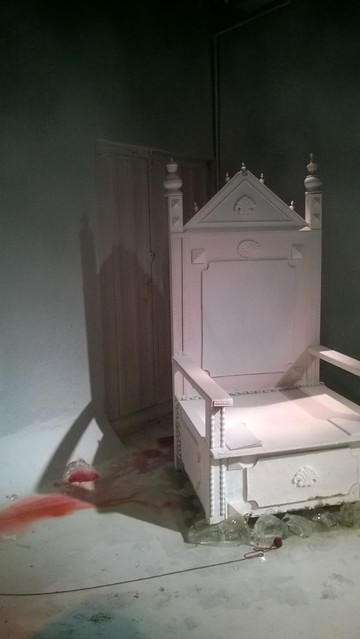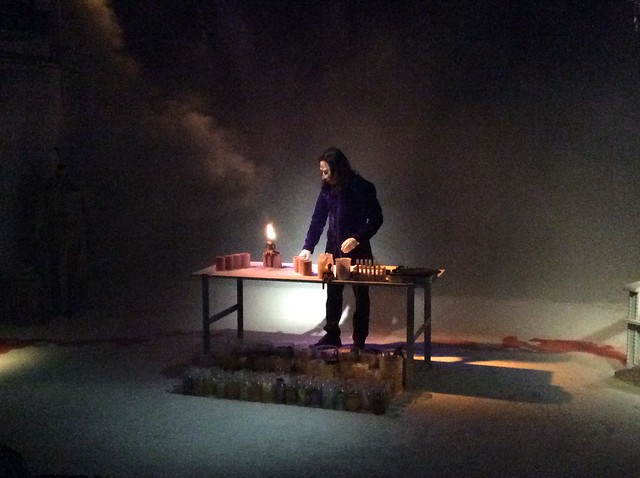A physical theatre piece by Teerawat Mulvilai sheds light on the unwritten rules and forces anchoring Thai society.
Teerawat Mulvilai, known for his political theatre pieces, is performing the final piece in his trilogy on freedom of speech. “ICEBERG, the Invisible” follows earlier performances in the Sathapana (The Establishment) series, the first being “Red Tank” and the second, “Iceberg.”
“Invisible” takes place in a dimly lit room. To the right is a white throne with blood seeping out from under it. In the centre is a table filled with preserves jars. In the jars are various “preserved” objects of Thai memorabilia, such as a flag-coloured whistle from the 2014 anti-election protests. To the left is a mannequin in a military uniform and an ice sculpture with a red, “bleeding heart” centre.
In this solo performance, Teerawat, dressed in a wooden mask and a regal blue coat, wheels around the room in a scooter before sitting down on the throne to contemplate. Then he takes a string of clay out of a preserves jar, and moulds clay birds before placing them in a bird cage. This is all done to a record playing show tunes from the musical “The King and I.” The masked man switches between tearing up books while on the throne, touching the “bleeding” ice sculpture, and feeding little clay pieces to the birds.

Teerawat Mulvilai sits on a white throne during his performance in "ICEBERG, the Invisible."
He then squeezes several clay birds to “death” to a tinny, 1950s-era recording of “Shall I Tell You What I Think of You?” Lyrics such as “All that bowing and kowtowing / To remind you of your royalty / I find a most disgusting exhibition” and “Don't let us up off our knees, Your Majesty / Give us a kick, if you please Your Majesty” incite a sort of shock within born-and-bred Thais like me. What Teerawat points out, however, is the fact that we are shocked by lyrics written over half a century ago—and that invokes self-disgust, fear, horror, that we are no different from that clay bird. “Invisible” goes on to deliver even more shocking self-horrors about the unseen forces in Thai society.
Prachatai talks to Teerawat on his inspirations and themes in “Invisible,” such as the unwritten rules in Thai society, and the unseen powers that perpetuate cycles of violence in it.
Teerawat uses ice as a mechanism for the "blood" to melt and continuously flow across the stage.
How is the inspiration behind “Invisible” different from the previous two parts?
As you can see, all three parts have this character in a wooden mask, but in each instalment he plays a different “role.” In “Red Tank,” the wooden mask represents the victims of political situations. He wakes up and there are tanks all around him. The performance focuses on fear derived from interaction with objects.
In the second instalment, “Iceberg,” an ice delivery boy plays around on stage with increasing violence and energy until in the bloody aftermath, the wooden mask comes out and “cleans up” the stage. This role of the wooden masked man in power is what I’ve continued in this third instalment. The victims and violence are the parts of society that’s “seen,” like the part of an iceberg that floats above the surface. In “Invisible” I wanted to talk about the larger, unseen mass of society that anchors it, keeping it from moving forward, like the part of an iceberg below the surface.
The bottom part of the iceberg would include things like beliefs, cultures, norms, and unwritten rules. The top part of the iceberg is based on these things. The bottom part, the unseen, unknown part, anchors and preserves aspects of society that prevent it from developing and moving forward.

Items in the preserved jars include "relics" of Thai society, such as a PDRC whistle and a traditional theatre puppet.
Some audience members have remarked that the performance’s use of symbolism reads like a Western novel. How do you think Thai audiences will receive this?
(laughs) There’s so much symbolism in Thai society too, so I’m sure they’ll get it. I’m sure they know the meanings behind the symbols already. And even if I told the message in a direct way, there’s a large chance they won’t accept it. A direct message doesn’t demand analysis, and people who disagree with it outright will just push it away.
Art isn’t a ready-made, processed piece made from a machine. So when I perform, I want to make viewers think about what they see in the theatre and relate it to the society outside, and how they can change it.
I just want them to think a bit. The bottom part of the iceberg is driven by ignorance.
Teerawat sets the inside of a hollow clay girl on fire.
“Invisible” is rivetingly scary at points. What is the role of fear in Thai society?
I think Thailand is quite an absurd society at times. The violent actors show no fear when they do their awful acts for their own benefit. What they do reminds me of this BBC documentary I once saw about an ex-dictator living on the Thai-Cambodian border. In the interview he said he didn’t regret what he did, but his hands were shaking under the table. It makes us ordinary people wonder if the perpetrators of violence feel any guilt or have a moral conscience, too. We have to wonder what drives the unseen, invisible power cycle.
Do you have hope for Thai society?
I don’t place my hopes in a hero, a knight in shining armour. These figures are too likely to be taken in by power and personal benefits.
I place my hope in regular people. Recently I’ve seen their morality expressed, when they’ve been pressed by the assholes in charge. These regular people spur usually indifferent people to action. Regular people will be the deciding factor on whether Thai society changes or not.
For my part, I’m using art to share my ideas with others, even if it’s just the few theatregoers who come to watch. But, you see, I have to do something! I can’t sit still in a situation like this. I think about how I’ll remember myself years later. What was I doing at the time? Did I do anything to help?
With the media and the academics all shut up, art is hope for a society like this. I need to communicate with the Thai middle class. They’re currently happy to be completely steamrollered by the authorities. This middle class will only be woken up by things that they feel directly affect them, such the economy, not ideas. The cries of upcountry villages seem very far away to them. They’re in their own world, a mano-land [self-delusional land], if you will.

A pig's heart is also featured in "ICEBERG, the Invisible."
I want my art to be like a stone thrown into water, and cause a ripple effect. The part in the performance where I play with strings and clay: will they consider the networks that manipulate them? Will they consider any parallels to reality when my character plays with an army tank and dies?
Violence is born from wanting to preserve certain aspects of society. This can be shown in resistance against external influences, pushing away anything from Rohingya to western ideas to Uighurs, but it can also be against internal influences. The powerless are silenced by the powerful, and their voices go unheard.
A single signature from a powerful person can ripple out into unseen murderous acts; an event in Bangkok can ripple out to disastrous consequences in the provinces.
“ICEBERG, the Invisible” is performing at Democrazy theatre Studio from 7-18 July, Tuesdays to Saturdays at 8 pm.
Read related stories:





